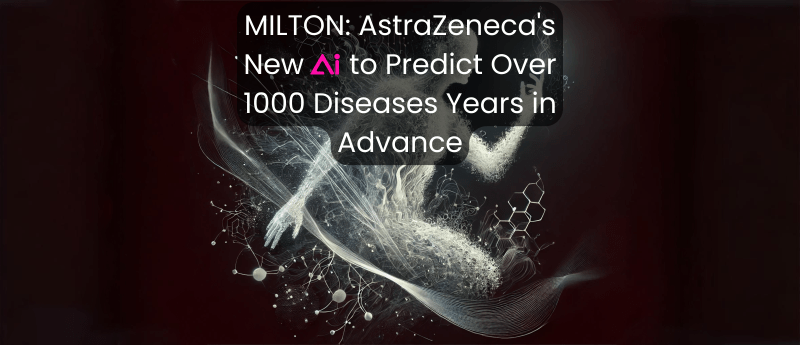MILTON: AstraZeneca’s New AI to Predict Over 1000 Diseases Years in Advance

Researchers at AstraZeneca have developed an AI tool called MILTON that can detect the early signs of more than 1000 diseases. The AI analyzes information about previously diagnosed patients to uncover patterns in their biological signatures. These patterns can be used to predict who is likely to develop a disease years in advance, saving time and – more importantly – lives. The results of this study set a new benchmark for the future of diagnostics.
Preventative medicine represents a cornerstone for the future of medicine. Often, when individuals start experiencing symptoms, the disease has progressed to a point where it is challenging to treat.
If doctors can easily predict the onset of a disease, effective action can be taken to devise optimal treatment plans, potentially transforming the quality of healthcare.
In this regard, AI could be an incredibly useful tool for doctors and researchers.
MILTON
Indeed, a research group at AstraZeneca has developed a new AI model named ‘MILTON’ and put it to the test; yielding competitive results.
The group built their AI model using data from ‘UK Biobank’, a large-scale health database following the lives of 500,000 people over the span of 30 years.
Biobank contains biological data that can be easily obtained through a routine doctor appointment:
- Biomarkers in blood and urine samples
- Weight
- Blood pressure
- Age and sex
It is thought that such a large database will reveal insights into the genetic and environmental mechanisms behind different diseases.
MILTON analyzes this information and identifies patterns that implicate various factors in the development of a disease – ordinarily, these patterns could be easily missed by researchers.
Indeed, the AI’s predictive performance was “exceptional” for 121 diseases, with an AUC of over 0.9. The model was also deemed to have “highly predictive” performance for an additional 1,091 diseases.
How Does MILTON Work?
Although the results of this study are impressive, it is worth mentioning that this is not the first time researchers have used AI in this capacity.
So, what makes MILTON stand out from other models?
Previous studies have applied deep learning (DL) methods to ‘fill in’ gaps in any missing characteristics in the dataset – a process known as feature imputation.
However, rather than trying to estimate missing values, MILTON focuses on improving disease prediction power by incorporating a big range of existing data into its calculations.
The group first applied a Gradient Boosting model to a case-control set – a type of machine learning tool that sequentially builds a series of models, each one stronger than the last.
In this paradigm, the researchers will first use a ‘weak learner’ model (meaning its predictions are only marginally better than random guessing) which will undoubtedly make errors. The next model will learn from the example set from the first model and attempt to correct these mistakes, instead of starting from scratch.
Over many iterations, previous models are combined to create an ensemble AI, a robust model that can capture complex scientific data.
Ethical Considerations
While the predictive power of MILTON has been described as “remarkable” by researchers, there are ethical considerations that must be taken into account if such tools are to be used publicly.
One major issue is data privacy—AI systems rely on vast amounts of personal health data, and there is a risk of misuse if proper safeguards aren’t in place. Without strict privacy protections, sensitive health information could be exploited by third parties, including insurance companies or employers, leading to discrimination or breaches of patient confidentiality.
Moreover, the regulation of AI’s predictive power is critical. As the tool becomes more advanced, its predictions could be used to assess a person’s health risks without their knowledge or consent.
Strict guidelines and oversight are necessary to prevent the misuse of predictive health data and ensure that AI tools are used ethically and responsibly in medical settings.
Future Implications
This study unlocks the door to a new age of diagnostics. AI could help clinicians identify people who are more likely to develop a disease, up to 10 years in advance.
Potentially, those who are more at risk could take preventative measures, such as dietary and exercise changes. Similarly, clinicians could intervene earlier with treatment strategies to mitigate disease progression.
This could have a profound impact in the healthcare setting, where time is often a critical factor in prognostic outcomes.





